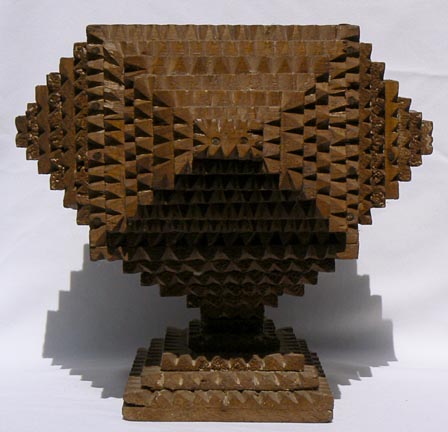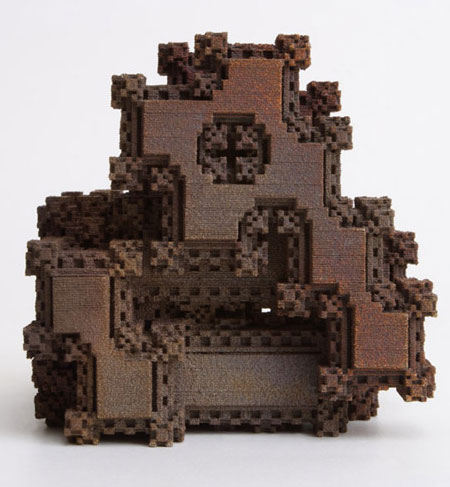Perfect day - Bennett celebrates the good times at double happiness with a selection of oversized photos people persist in posting to the internet.
Day: April 21, 2010
Tramp Art vs Digitally Printed Tramp Art

Carved box from The History of Tramp Art

Driessens & Verstappen, Breed (a computer program that uses artificial evolution to "grow" detailed sculptures and print them in stainless steel powder with a binder), via Data Is Nature
Gene Wolfe and Patera Quetzal
In his breakthrough four-part novel Book of the New Sun, 1981-84, Gene Wolfe served up a science fictional "dying Earth" adventure with artful language and plot convolutions, a future picaresque where the satirical targets are maddeningly, mind-twistingly unclear because so much of what we know and understand has decayed into sedimentary dust.
Yet for all its strengths the book isn't Nabokov or even Borges (as some claim) because it relies too much on the frisson of recognizing fanboy tropes buried beneath the elegant diction and narrative misdirection. "Ah, he's talking about a laser sword"; "That must me a dimensional doorway of some kind." A derisive term, fanboy, but the point is--you will never fully grok the book without some knowledge and love of an imaginative meta-text (or co-text, or side text...) based on heavy science fiction consumption. If you aren't interested in what a far future Earth looks like, altered by millions of years of wars, technological flux, and alien visitations, no amount of Shakespearean language, Barthesian storytelling tricks, or even the elusive mood of ennui that is Wolfe's special wrinkle on the genre, will make it interesting for you.
The later, annoyingly-similarly-named-one-hopes-not-just-for-marketing-purposes The Book of the Long Sun, 1993-96, suffers the same dilemma but is a more generous work in the sense that it might be possible to read it as political and religious allegory without caring about cybernetic thought transfer or the ecology of Dyson spheres. In other words, it more closely approximates the experience of living in the confusing, technologically-altered world we actually inhabit, rather than just recognizing alternate Earths genre writers have previously imagined. It also has a tighter story than New Sun's one damn thing after another plot. What follows is a severely abridged attempt to make sense of it [Caution: spoilers]:
In our far future (or is it our past? - nah), a visionary scientist sends an Ark out into space, carrying a cargo of plants, animals, humans, and robots in a Ringworldesque functioning ecosystem: a cylindrical hollow pod with cities, lakes, and mountains clinging to the insides via rotational gravity. Hundreds of years later, at the time of the novel, the Ark, called the "Whorl," has begun to break down. The scientist, Pas, died long ago but survives as a disembodied digital "copy" who can temporarily inhabit the bodies of individual humans living in the Whorl's city-states. He begins to send messages, disguised as religious revelations, telling the humans that they've reached their destination, a star with two habitable planets, and it's time for them to disembark the ship via waiting shuttles that will transport them down to their new home.
We don't know how long the Whorl has been parked in the system with the two planets, called Green and Blue. We also don't know when or how an inhabitant of Green, an intelligent creature of a species called "inhumi," came aboard the Whorl. Nevertheless, at the time of the book, the inhumu, Quetzal, has successfully disguised himself as a human and risen to the rank approximating a Cardinal's in the Whorl's Catholic-like religious order. He is a mysterious character: we know he is a vampire and flies around at night sucking the blood of children but he also helps the book's protagonist, Silk, on many occasions.
Only in the last few pages of this 1200 pager do we learn why Quetzal came to the Whorl: to guide humans down to Green, where they would be--livestock? presumably--for the inhumi. The narrative follows a group of people who land on Blue, escaping the Whorl after a series of battles among assorted city-states and their human and robot soldiers. Dying from a gunshot wound, Quetzal leads the escapees to a shuttle and recommends that they take it down to Green. After his passing, the shuttle's computer overrides his recommendation and lands the humans on Blue. Their ordeal is not over: we learn from a series of passing references that the shape-shifting, blood-sucking inhumi can travel between Blue and Green when the planets are in conjunction.
The reader may or may not then think back 650 pages to Quetzal's telling of the Adam and Eve story to one of his bishops (I admit I didn't). Here is an excerpt from the web page that did, Quetzal: His Nature and Deeds:
...Quetzal is an angel. Actually, he is a fallen angel, a demon, since during his conversation with Remora he tells the Adam and Eve story as related in the Chrasmological Writings and reveals the inhumi's intent among humanity:
"A-man and Wo-man like rabbits in a garden. The--what do you call them?...The cobra persuaded Wo-man to eat fruit from his tree, miraculous fruit whose taste conferred wisdom...It is all in the Writings. Or nearly all. A god called Ah Lah barred Wo-man and her husband from the garden...We seem to have lost sight of Ah Lah, by the way. I can't recall a single sacrifice to him. No one ever asks why the cobra wanted Wo-man to eat his fruit...In order that she would climb his tree, Patera. The man likewise. Their story's not over because they haven't climbed down."
So the inhumi are to be identified with the serpent in the Garden of Eden -- and of course in the Book of Revelation, Satan himself is identified as that serpent (Rev. 20:2)
The Quetzal story, which we thought was a subtheme, unexpectedly swells at the end to chime more sonorously than the rest of the book. Catholic convert and Lovecraft fan Wolfe chills with the idea of humanity fleeing Earth to a solar system where it will not be at the top of the food chain. The bits of Catholic dogma he mingles in the text suggest a coming test of faith the likes of which our long-suffering species hasn't seen. At one point the main character Patera Silk muses about the machinations of the Outsider (clearly the Judeo-Christian God): Evil exists so people will always turn to Him as the superior alternative--for their own good, not just for His vanity, Silk imagines. Without evil they would drift away from Him, His worst fear. The voyage of the Whorl assures more millennia of adoration, or salvation, depending on your view.
